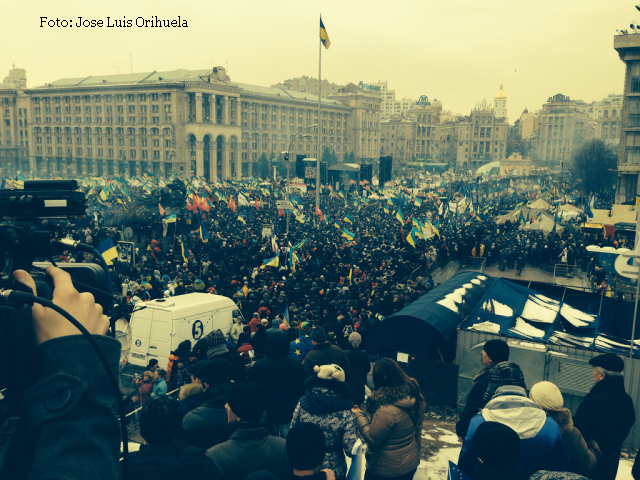Explosive situation in the Ukraine
The protests against the Ukrainian power are gradually extending across the whole country. Started last November, at first shyly and without any chances of success, the demonstrations sanctioned the government’s surprising decision to no longer sign the association and free trade agreements with the EU and, in exchange, to try a rapprochement with Moscow. At present the demonstrations are no longer limited to the capital Kiev and the regions in the west, a traditional stronghold of pro-western opposition, but they have spread to the towns in the east and south that are known as pro-Russian.

Bogdan Matei, 27.01.2014, 13:22
The protests against the Ukrainian power are gradually extending across the whole country. Started last November, at first shyly and without any chances of success, the demonstrations sanctioned the government’s surprising decision to no longer sign the association and free trade agreements with the EU and, in exchange, to try a rapprochement with Moscow. At present the demonstrations are no longer limited to the capital Kiev and the regions in the west, a traditional stronghold of pro-western opposition, but they have spread to the towns in the east and south that are known as pro-Russian.
Moreover, after some of the protesters have been killed in the clashes with the riot police, the demonstrators have gone more radical, their agenda beginning to exclude any compromise with the authoritarian regime of Viktor Yanukovych. By inviting the opposition to rule the country alongside the current regime, the Ukrainian president has put his adversaries in a delicate situation, appearing as a politician willing to make compromises but actually without intending to really comply with the requirements of the opposition, various analysts quoted by news agencies have said.
Legitimized by the crowd that took to the streets, the opposition leaders promote the people’s demands and reject all attempts at reconciliation made by a president discredited by the very bloodshed he has caused. Yanukovych offered to the opposition the positions of prime minister and deputy prime minister, also showing willingness to revise the Constitution, which would entail transferring some of his prerogatives to the government.
The opposition is asking, however, for Ukraine’s transformation into a parliamentary republic and for holding early presidential elections. Concerned with the escalation of violence at its eastern border, the EU on Monday asked both the Ukrainian Power and Opposition to show moderation. Brussels denounces the deterioration of human rights observation, the arrests in hospitals, the cases of people reported missing or tortured, and says that stopping these practices is a sine qua non for restoring trust in the government and society.
On the other hand, Opposition leaders are asked to take a distance from the violent protesters and to keep their demonstrations within peaceful bounds. Romania, whose border with the Ukraine spans hundreds of kilometers, has also expressed concern with the escalation of violence in that country.
The Romanian Foreign Ministry has said dialogue is the only way to resolve the current crisis. Romania’s concern regarding the situation in neighboring Ukraine is also justified by the existence of a Romanian community totaling half a million people in the west of that country.






























